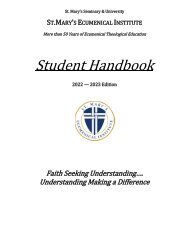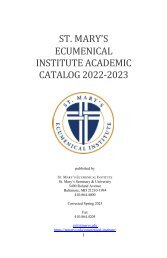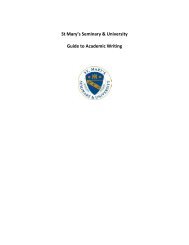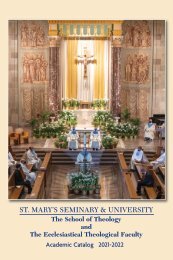School of Theology Catalog 2020
St. Mary's Seminary & University academic catalog for the School of Theology for the 2020-2021 academic year.
St. Mary's Seminary & University academic catalog for the School of Theology for the 2020-2021 academic year.
Create successful ePaper yourself
Turn your PDF publications into a flip-book with our unique Google optimized e-Paper software.
Credit Units:
St. Mary’s Seminary & University operates on
a 15-week semester system. Final examinations
preceded by study days are scheduled
during the fifteenth week. The number of
credit units assigned to a course is indicative
of the total work load which the course should
demand. One semester unit is considered to
entail 42 hours of effort including class time,
reading, preparation, assignments, and examinations.
A full-time student must carry a minimum
of 9 units per semester and may, with
the approval of the Academic Dean, carry a
maximum of 18 units per semester.
Curricular Standards:
Expectations for courses at various levels are
the following: 500-level (required) and 600-
level (elective) courses involve 650-750 pages
of reading and 2-3 evaluative
instruments; 700-level (electives
taken for S.T.L. credit) courses
involve 1000-1200 pages of reading
and an additional evaluative
instrument (or more substantive
versions of the 2-3 basic instruments)
beyond the 600 level
showing a greater depth of
understanding of the material
and familiarity with the methodology
used in the area under
study; 800-level (S.T.L. seminar)
courses involve 1000-1200 pages
of reading and an in-class oral
presentation and either a
research paper or another written
exercise of a synthetic character.
Some examples of appropriate
evaluative instruments
include written and oral
quizzes/examinations, research
papers, book reviews, case studies,
oral presentations in class,
and the like. Each term the
expectation is that students may
register only for the number of
credit hours listed in the model
curriculum for that term (typically 15 credits).
Overloads need the approval of the Dean of
the School of Theology. Resident seminarians
are required to register for a minimum of 9
credits. Non-S.T.L. students wishing to enroll
in 800-level classes require the permission of
the Dean of the School of Theology.
Due Process and Grievances
in Academic Matters:
Students with complaints in academic matters
may appeal to have the complaint thoroughly
reviewed and a judgment made according to
the following 3-stage procedures for academic
due process. In Stage 1, the student
consults with the faculty member involved.
In most cases, the student and the faculty
member should resolve the complaint on this
level. In Stage 2, if no resolution has been
achieved in Stage 1, the student may bring
31







